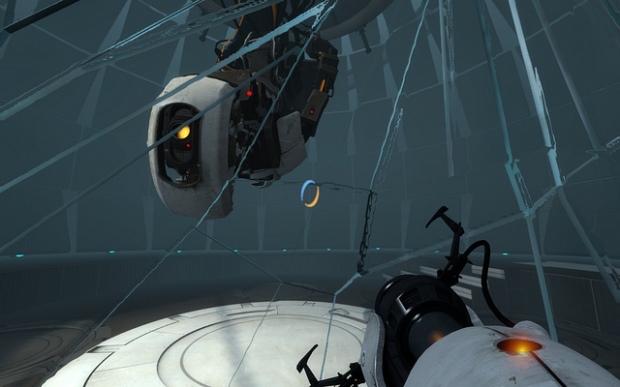Four Independent Female Game Characters
The fourth of July represents the day the 13 colonies declared independence and became a new nation. Well, the same could be said about female protagonists in video games. There's a number of female video game tropes, but some characters have defied these to branch out on their own. In honor of Independence Day, here are four independent video game women you should know.
Lara Croft, Tomb Raider
An English archaeologist with a thirst for adventure and ancient artifacts, Lara Croft has earned a seat at the table as one of the most widely recognized video game characters in history. Her athleticism and duel-wielding gun play defines her as a force to be reckoned with. Since her inception in the 90s, she's been a glorified sex symbol. But developer Crystal Dynamics' 2013 reboot of Tomb Raider, which is now the most successful game of the series, tore its foundation down. Croft no longer dripped of sex appeal. She reeked of fear. In the reboot we watch her transform, painfully so, into a true tomb raider. It's empowering when you consider she's the one rescuing her friend Sam, the damsel in the story. By the end, our protagonist is beat down and bloody but finally human. It's a beautiful transformation that makes her worthy of the first pick on our list.
Elizabeth, Bioshock Infinite

Elizabeth's something of a bird in a guilded cage when we first meet her in Bioshock Infinite. She's locked in a tower, a-la Princess Peach style, and it's heavily guarded by Songbird, a strange mechanical creature with disturbing attachment issues. Infinite begins as our protagonist, Booker DeWitt's, story, but by the end, all any fan can even talk about is Elizabeth.
What I love about Infinite is how the developers laid the groundwork for your relationship with her. A major plot point in the story obstructs any chance of this relationship being mistaken for something romantic or sexual. When you think of this woman, you think of her because you care. It's ironic, really. Elizabeth is a character everyone wants to protect, but they should reconsider that instinct. She wields a power that literally bends time and space. It's as dangerous as it is intriguing. And yet you can't help but love the girl whose missing a pinky, concusses you with a wrench, and wants to visit Paris someday. Her physical transformation almost hurts a little. At the start you meet this young, impressionable polished girl, and mid-way through you're looking at a woman in a ripped, off-white blouse drenched in someone else's blood. That's when Elizabeth's story overlaps our own. She steals it right from under Booker's nose.
Clementine, Telltale's The Walking Dead

Clementine isn't exactly a woman, but that's what makes her addition to this list all the more important. At just 11 years old, she's experienced more death and discouragement than most elders have in their lifetimes. Season one of The Walking Dead introduces us to Clementine through Lee, our protagonist. Similarly to Bioshock, we view the post-apocalyptic world through Lee's eyes. He mentors Clementine through her short youth. Our first instinct is to protect such a doe-eyed, mousy-voiced girl, but that can't happen forever. A tragic string of events forces Clementine to part with her protector, and mature quickly in order to survive. Her story is one of melancholy as she develops into an adolescent, making adult decisions daily to keep her alive. Despite the pressures of this new life, she thrives, perhaps more so than any other adult could.
Jodie, Beyond 2 Souls
Beyond 2 Souls features an incredibly strong female lead. I'm not saying that because I like the character Jodie Holmes. I'm saying that because Ellen Page was motion-captured to play her in the video game. Page has a history of playing strong female characters, from her role in the indie film Hard Candy to Inception and Whip It.

In Beyond 2 Souls, Jodie is an outcast. A product of two psychic parents, she carries a sinister weight on her shoulders--literally. Aiden, an unseen, supernatural force is "tethered" to her. Jodie's ability to use Aiden attracts scientists and the CIA. Souls follows Jodie from child to adulthood as she goes from the shy junior high student at the birthday party to the troubled teen confined to her room to the CIA recruit in advanced training. There are moments where Jodie's life takes a turn for the worst--she becomes homeless, she goes on the run from the CIA. In each case, she digs her way out, sometimes with Aiden's help, but many times through her own fantastic fighting abilities, and clever way of thinking. She shows true resilience and perseverance.
BONUS
GLaDoS, Portal

All right, so GLaDoS isn't exactly a female. She's an artificial intelligence computer, but if Hal from 2001: A Space Odyssey can be gender categorized, so can she. GLaDoS isn't one to mince words. She's an antagonist through and through, spitting vitriol at our protagonist, Chell, as she makes her way through test chambers in a laboratory.
But there's something special about GLaDoS. She's completely self-sustained, having taken over the laboratory for herself. The way she casually, and constantly, alludes to your character's death is alarming at first, but almost comforting after a while given how sardonic she is: "Didn't we have some fun though? Remember when the platform was sliding into the fire pit and I said 'Goodbye,' and you were like 'No way!' And then I was all, 'We pretended we were going to murder you.' That was great."
While her humor's dark and her threats are sincere, GLaDoS does have her redeeming qualities. In Portal 2 she's turned into a potato by another robot villain, and becomes receptive to human emotions. It doesn't necessarily last, but GLaDoS does allow Chell to go free. There's also that whole moment in the original Portal when she leaves us with a serenade.
